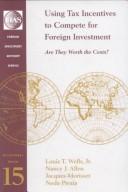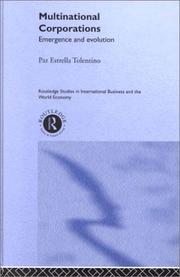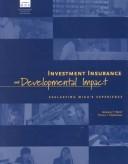| Listing 1 - 10 of 16 | << page >> |
Sort by
|
Book
ISBN: 9789264294899 Year: 2001 Publisher: Paris : OECD Publishing,
Abstract | Keywords | Export | Availability | Bookmark
 Loading...
Loading...Choose an application
- Reference Manager
- EndNote
- RefWorks (Direct export to RefWorks)
Depuis qu’elle a recouvré son indépendance, en 1990, la Lituanie a connu une transformation économique remarquable. Dès la fin de 2000, ce processus avait été grandement stimulé par un apport de quelque 2.3 milliards de dollars d’IDE en provenance des pays européens, des Etats-Unis et des pays voisins. L’IDE a contribué aux investissements nouveaux, aux fusions-acquisitions et à la privatisation des entreprises d’Etat. La mise en place de conditions propices à l’IDE a été un élément central de la stratégie économique de la Lituanie, et à l’heure actuelle il subsiste relativement peu de restrictions dans ce domaine. L’IDE a été également encouragé par la perspective de l’entrée de la Lituanie dans l’UE et par son adhésion à l’Organisation mondiale du commerce, le 31 mai 2001. Parmi les grands chantiers en cours, on peut citer l’achèvement rapide des privatisations, la poursuite de la libéralisation et l’ouverture à la concurrence étrangère. Une priorité absolue est accordée au règlement des problèmes d’application découlant de la refonte de l’ancien régime réglementaire. Le 26 juillet 2001, la Lituanie a été admise à adhérer à la Déclaration de l’OCDE sur l’investissement international et les entreprises multinationales. Cela contribuera sans aucun doute à consolider ses avancées et à développer ses relations économiques avec les pays de l’OCDE et les autres adhérents à la Déclaration.
Investments, Foreign --- Capital exports --- Capital imports --- FDI (Foreign direct investment) --- Foreign direct investment --- Foreign investment --- Foreign investments --- International investment --- Offshore investments --- Outward investments --- Capital movements --- Investments --- Lithuania

ISBN: 1280087307 9786610087303 0585437335 0821349929 Year: 2001 Publisher: Washington, DC : World Bank,
Abstract | Keywords | Export | Availability | Bookmark
 Loading...
Loading...Choose an application
- Reference Manager
- EndNote
- RefWorks (Direct export to RefWorks)
Investments, Foreign. --- Tax incentives. --- Investments, Foreign --- Tax incentives --- Incentives, Tax --- Tax subsidies --- Taxation --- Tax expenditures --- Capital exports --- Capital imports --- FDI (Foreign direct investment) --- Foreign direct investment --- Foreign investment --- Foreign investments --- International investment --- Offshore investments --- Outward investments --- Capital movements --- Investments

ISBN: 0415145759 0203288548 0203208676 1134759053 1280094419 8763000482 9780203208670 9780415145756 9786610094417 6610094411 9781134759002 9781134759040 9781134759057 1134759045 9788763000482 9781280094415 Year: 2001 Publisher: New York : Florence : Routledge Taylor & Francis Group [distributor]
Abstract | Keywords | Export | Availability | Bookmark
 Loading...
Loading...Choose an application
- Reference Manager
- EndNote
- RefWorks (Direct export to RefWorks)
This work presents case studies of the emergence and evolution of MNCs based in 11 developed and developing countries of widely divergent patterns of national development. From this analysis, the author develops a comprehensive theory of the emergence and evolution of MNCs from a macroeconomic perspective.
International business enterprises --- Investments, Foreign --- Technological innovations --- Economic aspects --- Capital exports --- Capital imports --- FDI (Foreign direct investment) --- Foreign direct investment --- Foreign investment --- Foreign investments --- International investment --- Offshore investments --- Outward investments --- Capital movements --- Investments

ISBN: 1280087595 9786610087594 0821349139 Year: 2001 Publisher: Washington, D.C. : World Bank,
Abstract | Keywords | Export | Availability | Bookmark
 Loading...
Loading...Choose an application
- Reference Manager
- EndNote
- RefWorks (Direct export to RefWorks)
Investment guaranty insurance. --- Country risk --- Investments, Foreign --- Country risk, Political --- Political risk (Foreign investments) --- Risk --- Insurance, Investment guaranty --- Investment guarantee insurance --- Investment insurance --- Insurance --- Multilateral Investment Guarantee Agency. --- MIGA --- Multilaterale Investitions-Garantie-Agentur --- Wakālah al-Dawlīyah li-Ḍamān al-Istithmār --- M.I.G.A.

ISBN: 9041115242 Year: 2001 Publisher: The Hague Kluwer law international
Abstract | Keywords | Export | Availability | Bookmark
 Loading...
Loading...Choose an application
- Reference Manager
- EndNote
- RefWorks (Direct export to RefWorks)
Law --- Droit --- Business law --- -Investments, Foreign --- -Business Law --- -346.0709561 --- Eb1.ftur --- Business --- Commerce --- Law, Commercial --- Mercantile law --- Law merchant --- Maritime law --- Capital exports --- Capital imports --- FDI (Foreign direct investment) --- Foreign direct investment --- Foreign investment --- Foreign investments --- International investment --- Offshore investments --- Outward investments --- Capital movements --- Investments --- Law and legislation --- -Law and legislation --- -Business law --- Commercial law --- Investments, Foreign --- 346.0709561

ISBN: 1567203752 0313004641 0585384479 9780585384474 9780313004643 Year: 2001 Publisher: Westport, Conn. : Quorum Books,
Abstract | Keywords | Export | Availability | Bookmark
 Loading...
Loading...Choose an application
- Reference Manager
- EndNote
- RefWorks (Direct export to RefWorks)
Real estate investment. --- Investments, Foreign. --- Capital exports --- Capital imports --- FDI (Foreign direct investment) --- Foreign direct investment --- Foreign investment --- Foreign investments --- International investment --- Offshore investments --- Outward investments --- Investment in real estate --- Real property investment --- Capital movements --- Investments --- Land speculation --- Real estate business

ISBN: 0821348345 Year: 2001 Publisher: Washington World Bank
Abstract | Keywords | Export | Availability | Bookmark
 Loading...
Loading...Choose an application
- Reference Manager
- EndNote
- RefWorks (Direct export to RefWorks)
Country risk --- International business enterprises --- Investments, Foreign --- Risk management --- 336.312.3 --- 368.612 --- AA / International- internationaal --- Country risk, Political --- Political risk (Foreign investments) --- Risk --- Management --- Solvabiliteit, kredietwaardigheid van de landen. Risicolanden --- Verzekeringen van internationale kredieten en van investeringen --- Overseas Private Investment Corporation --- O.P.I.C. --- OPIC --- United States. --- International finance --- Developing countries

ISBN: 1280082798 9786610082797 9264188401 9789264188402 9264183442 Year: 2001 Volume: 4 Publisher: Paris : OECD Publishing,
Abstract | Keywords | Export | Availability | Bookmark
 Loading...
Loading...Choose an application
- Reference Manager
- EndNote
- RefWorks (Direct export to RefWorks)
This report examines the currently highly topical issue of corporate tax incentives for foreign direct investment (FDI). The ability to offer an internationally competitive tax system is increasingly seen today as a determinative factor influencing FDI. With corporate income tax identified as the component that impacts most directly on multinational companies, much of the pressure for lowering host country tax burdens to attract capital is focused upon this tax. At the same time, corporate taxation plays an important withholding function, raising revenues on domestic-source income that might otherwise escape the tax net. The desire to tax this income while not discouraging foreign investors raises critical questions concerning the sensitivity of FDI to taxation and the appropriate setting of various tax provisions that determine the host country tax burden and influence investment and financing behaviour. This report considers various corporate tax measures to encourage FDI and a range of issues relevant to assessing their use. Given the central question of how much additional investment can be expected from tax relief and at what cost, the report summarises recent empirical findings which show increasing sensitivity of FDI to host country tax burdens, consistent with trends towards increasing globalisation of production. Other findings are considered which highlight tax-planning opportunities created by certain approaches, leading to unintended revenue leakage. The report emphasises the need to assess possible host and home country tax interactions which can influence tax incentive results, and more generally the need to look beyond what conventional economic analysis might suggest. While the report is intended primarily as a guide for policy makers in emerging market economies, it may serve as a reference document to tax policy analysts more generally
Taxation --- Finance and Investment --- Investments, Foreign --- Tax incentives --- Finance --- Investment & Speculation --- Business & Economics --- Government policy --- Incentives, Tax --- Tax subsidies --- Capital exports --- Capital imports --- FDI (Foreign direct investment) --- Foreign direct investment --- Foreign investment --- Foreign investments --- International investment --- Offshore investments --- Outward investments --- Tax expenditures --- Capital movements --- Investments --- Tax incentives. --- Government policy. --- Duties --- Fee system (Taxation) --- Tax policy --- Tax reform --- Taxation, Incidence of --- Taxes --- Finance, Public --- Revenue --- Corporations --- Encouragements fiscaux --- Investissements étrangers --- Sociétés --- Impôts
Book
ISBN: 9211125294 Year: 2001 Volume: *16 Publisher: New York and Geneva United Nations
Abstract | Keywords | Export | Availability | Bookmark
 Loading...
Loading...Choose an application
- Reference Manager
- EndNote
- RefWorks (Direct export to RefWorks)
339 --- Affiliated corporations --- -Free trade --- -Investments, Foreign --- -339 --- Capital exports --- Capital imports --- FDI (Foreign direct investment) --- Foreign direct investment --- Foreign investment --- Foreign investments --- International investment --- Offshore investments --- Outward investments --- Capital movements --- Investments --- Free trade and protection --- Trade, Free --- Trade liberalization --- International trade --- Affiliated companies --- Affiliates (Corporations) --- Allied companies --- Allied corporations --- Associated companies --- Controlled corporations --- Corporations --- Subsidiary corporations --- Handel. Internationale economische betrekkingen. Wereldeconomie --binnenlandse als buitenlandse handel; zie ook {339.3} en {339.5} --- Government policy --- Law and legislation --- 339 Handel. Internationale economische betrekkingen. Wereldeconomie --binnenlandse als buitenlandse handel; zie ook {339.3} en {339.5} --- Free trade --- Investments, Foreign
Book
ISBN: 9789264294950 Year: 2001 Publisher: Paris : OECD Publishing,
Abstract | Keywords | Export | Availability | Bookmark
 Loading...
Loading...Choose an application
- Reference Manager
- EndNote
- RefWorks (Direct export to RefWorks)
Depuis qu’elle a recouvré son indépendance, en 1991, l’Estonie a connu une remarquable transformation économique. Fin 2000, elle avait reçu environ 2.65 milliards de dollars d’IDE en provenance des pays européens et des Etats-Unis, et investi quelque 443 millions de dollars dans les autres pays baltes. L’IDE a financé des investissements nouveaux, des fusions-acquisitions et la privatisation d’entreprises d’Etat. L’instauration de conditions propices à l’IDE et l’ouverture aux échanges sont les éléments clés de la stratégie économique de l’Estonie. L’Estonie a été incluse dans le premier cercle des pays candidats à l’entrée dans l’UE, et a adhéré à l’Organisation mondiale du commerce le 13 novembre 2001. La refonte de l’ancien régime et la privatisation sont pratiquement achevées, et les autorités s’efforcent tout particulièrement de réduire la bureaucratie et d’améliorer encore la réglementation. Il subsiste très peu de restrictions à l’encontre de l’IDE. L’Estonie doit maintenant relever le défi de la concurrence et rattraper les nations plus prospères. Le 26 juillet 2001, l’Estonie a été admise à adhérer à la Déclaration de l’OCDE sur l’investissement international et les entreprises multinationales. Cela contribuera sans aucun doute à consolider les avancées récentes de l’Estonie et à développer encore ses relations économiques avec les pays de l’OCDE et les autres adhérents à la Déclaration.
Investments, Foreign --- Estonia --- Capital exports --- Capital imports --- FDI (Foreign direct investment) --- Foreign direct investment --- Foreign investment --- Foreign investments --- International investment --- Offshore investments --- Outward investments --- Capital movements --- Investments --- E.N.S.V. --- Eesti --- Eesti Nõukogude Sotsialistik Vabariik --- Eesti NSV --- Eesti Vabariik --- Ehstland --- ENSV --- Esthland --- Esthonia --- Estland --- Estonian S.S.R. --- Estonian Soviet Socialist Republic --- Estonian SSR --- Ėstonii︠a︡ --- Estonija --- Ėstonskai︠a︡ S.S.R. --- Ėstonskai︠a︡ Sovetskaia Sot︠s︡ialisticheskaia Respublika --- Ėstonskai︠a︡ SSR --- Estonskaya S.S.R. --- Estonskaya Sovetskaya Sot︠s︡ialisticheskaya Respublika --- Estonskaya SSR --- R.P.S.S. Estonia --- Republic of Estonia --- RPSS Estonia --- Viro --- Эстония --- Ėstli︠a︡ndskai︠a︡ gubernīi︠a︡ (Russia) --- Ostland
| Listing 1 - 10 of 16 | << page >> |
Sort by
|

 Search
Search Feedback
Feedback About
About Help
Help News
News